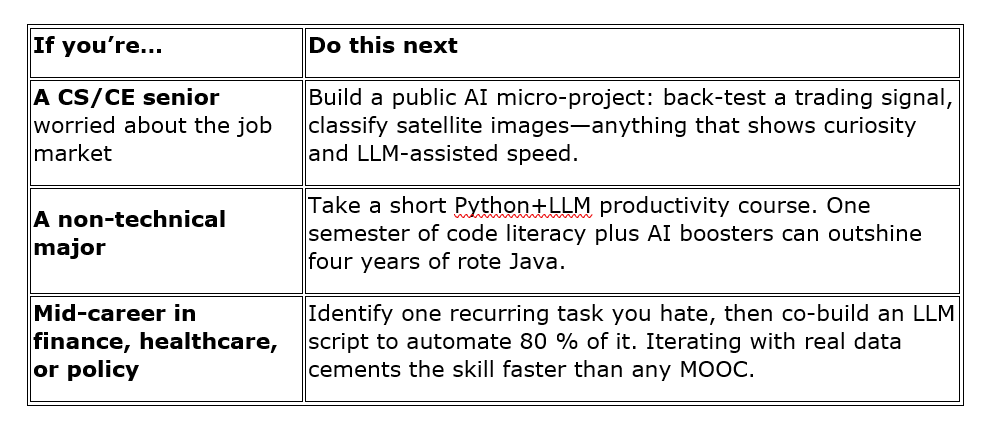Does Coding Still Matter When “Computer Engineering” Lands on the “Worst Majors” List?
The headline that stopped me in my tracks
Visual Capitalist’s recent graphic, “Ranked: The 20 Worst College Degrees for Finding a Job,” shows computer engineering graduates posting a 7.5 % unemployment rate—one of the highest among 2025 majors1.
For anyone who grew up hearing “learn to code and you’ll never worry about work,” that chart feels like whiplash. If the market is oversupplied with coders, do programming skills still matter in the age of AI?
My answer—an emphatic yes—hinges on three observations.
1. Oversupply ≠ Obsolescence
The unemployment spike says more about volume than value. Universities churned out record numbers of CS/CE graduates over the last decade. Meanwhile, entry-level tech hiring slowed as companies automated routine tasks (the very jobs juniors once filled). The result is a traffic jam at the on-ramp, not a dead-end road.
Coding remains the lingua franca of digital systems. Every AI model, no matter how “no-code” the interface, ultimately depends on well-structured code under the hood. When supply finally matches new, AI-augmented demand—autonomous-vehicle safety layers, climate-tech data pipelines, quantum-secure protocols—the graduates who kept their skills sharp will move to the front of the queue.
2. LLMs change how you code, not whether you should
Large language models can now generate functional scripts from plain-English prompts. That redefines the craft but doesn’t replace it. Think of LLMs as co-pilots:
What’s left? System thinking, architecture, and verification—all impossible without foundational coding literacy. You can ask an LLM for a multi-threaded Python routine, but you still need to sanity-check race conditions and ensure it won’t melt your GPU budget.
3. Coding is now a force multiplier for domain expertise
In finance, being “T-shaped” once meant pairing markets knowledge with enough Excel to build macros. Today, pairing markets knowledge with Python, SQL, and prompt-engineered LLM helpers lets a single analyst:
Ingest gigabytes of unstructured news,
Run sentiment models on-the-fly, and
Auto-generate risk memos before markets open.
That’s career leverage no spreadsheet jockey can match. Similar stories are unfolding in drug discovery, climate science, even journalism. The common thread: coding amplifies whatever else you know.
Re-framing the headline
So how do we reconcile “worst-degree” unemployment stats with the claim that coding is more vital than ever? A helpful lens is supply, skill-mix, and signal:
Supply ≠ Skill
Many new grads = tougher competition for jobs that prize generic coding. Distinguish yourself by marrying code with a domain nobody else in the room understands.Skill-Mix > Single Skill
LLM era rewards hybrids: professionals who can pair hands-on coding and prompt craft with domain insight, product sense, and ROI storytelling. They don’t just write prompts and audit outputs; they turn those outputs into new revenue lines, reshape workflows, and brief executives on risk-adjusted impact.Signal Matters
A CS degree once signaled “tech fluency.” Now recruiters look for personal projects, GitHub repos, and evidence that you learned after graduation. Keep shipping.
Action plan for students & mid-career pros
Closing thought — coding’s second wind
First-generation coders unlocked the digital revolution; second-generation coders built the internet. Third-generation coders—augmented by LLMs—will weave AI into every sector of the economy. Headlines about unemployment reflect a short-term mismatch, not a terminal decline.
In other words, coding didn’t lose its value; it leveled-up its entry exam. The bar is no longer can you memorize syntax? but can you wield code + AI to solve problems others can’t?
Those who answer yes will thrive—degree rankings notwithstanding.



